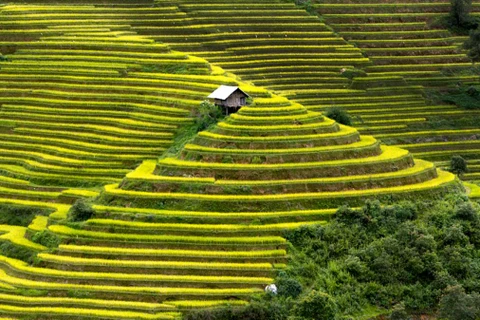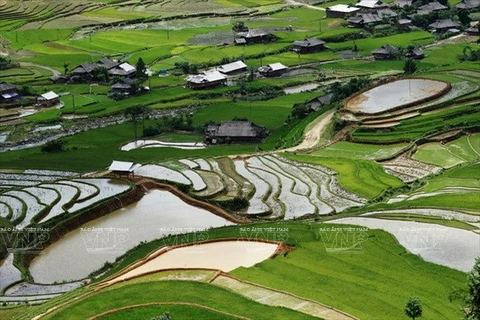Yen Bai province in the northwest hopes to turn one of its mountain villages, Nam Khat, into a second Sapa, provincial Party Secretary Pham Duy Cuong has said.
Cuong recently led a delegation to visit the village in Mu Cang Chai district. About 95 percent of the locals are of Mong ethnic stock.
District official Luong Van Thu told Cuong that Nam Khat would receive long-term investments to develop.
Local resident Thao Nha Cua, 63, said he was happy to hear of the project.
"I already have a large and spacious wooden house with traditional Mong architecture, but I will build another house on stilts for visitors.
"I will also invest in cultivating local specialities, such as tao meo (Mong jujube), and breed Mong black chicken, which is good for one's health, particularly for pregnant women," said Cua.
Cua said his seven children, five of them university graduates and now village cadres, were excited to join in the project.
"Our large jujube garden and cardamom bushes give us a good income of between 250-300 million VND per year. They will also be good for tourism," said Cua, adding that many travellers to the village were interested in visiting his garden.
Writer Nguyen Van Toai said Nam Khat's beauty and specialties inspired him.
"I often choose the village to relax and compose my work. It's temperature and landscape are so similar to Sapa," he said.
Thu said the district's primeval forests would be carefully protected to serve travellers.
"We are calling for investors to develop a hundred hectares of land on the high mountain to build a convalescence and relaxation complex," said Thu.
He said the district planned to build roads to the village centre, hot water baths and a safety path and cable car to caves on the mountain.
Le Xuan Dung, Deputy Head of Mu Cang Chai District's Natural Resource and Environment, said people could spend two days discovering the beauty of Hang La cave.
He said the cave was of the same class as Phong Nha Ke Bang in the central province of Quang Binh, which received World Heritage recognition in 2003.
Dung said the district planned to train Mong girls in cultural skills while building a network to manage community tourism.
Hearing of the project, Cuong told Thao A Giong, secretary of the Nam Khat's Youth Union, that Mong youngsters would be the main personal resource.
"Whether Nam Khat escapes from poverty will be up to these young people," he said.
Nam Khat is located about 30km south-east of Mu Cang Chai district. It is a poor area in the province. People have an average income of 5.8 million VND per capita per year. But fortunately it has mountains ranging from 700 to 1,700 metres high.
The village's biggest advantage is that the weather is cool all year round with an average temperature of 20 degrees Celsius.
Thanks to good land and weather, the village is lucrative for high profit crops of cardamom, jujube, honey and pigs, which sell well in big city like Hanoi.
Of the district's 24 villages, Nam Khat has a good road network. Vehicles of goods can reach all of them.
Village Chairman Chang The Suu said he hoped the project would lead to prosperity for the hard working local people.-VNA






















